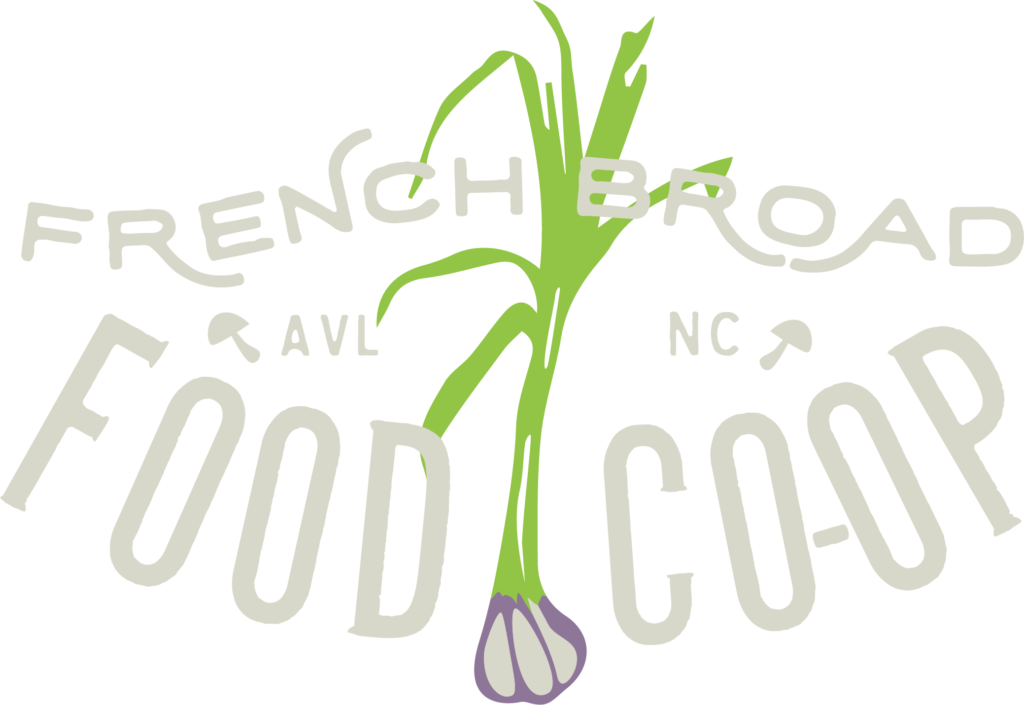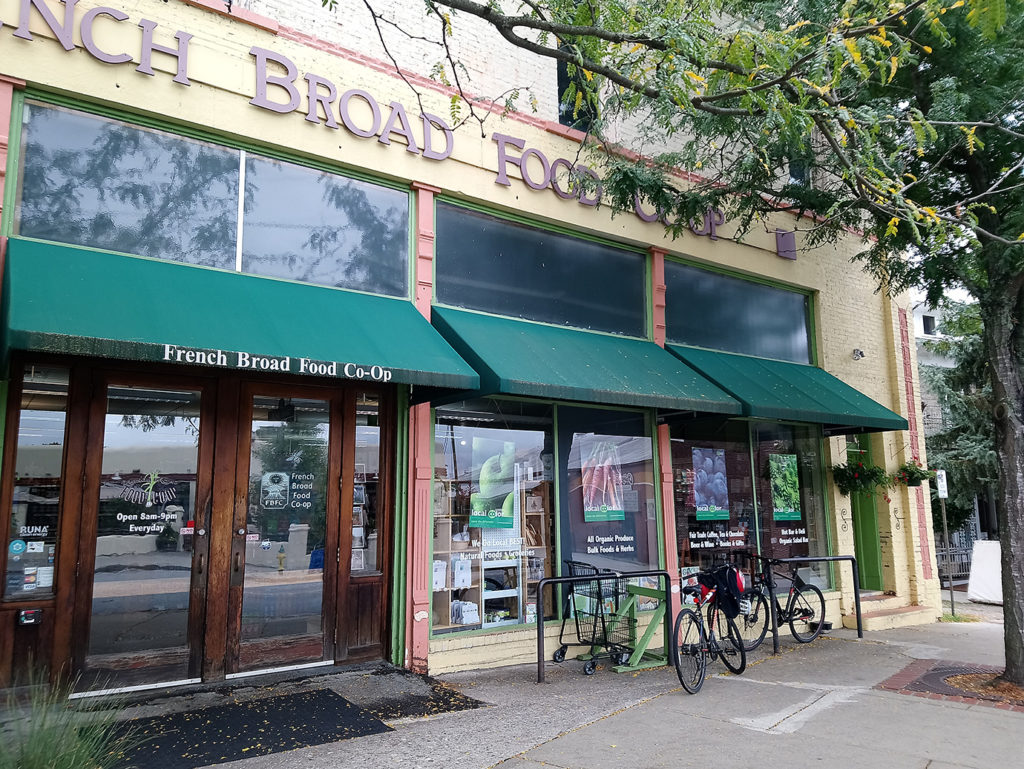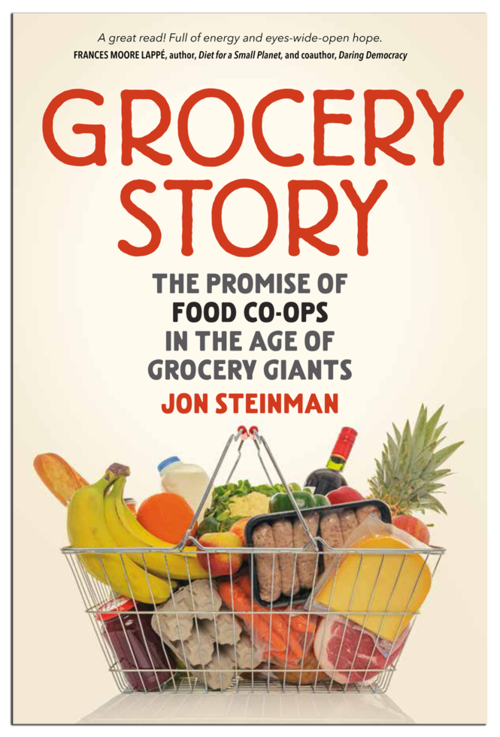Focusing on natural foods was seen as alternative — even a little weird — around the time a small group of people who took eating right seriously hatched the idea that became French Broad Food Co-Op.
The food-buying club started on a few front porches in the mid-1970s, made its first expansion by moving into a potter’s shed and then found some elbow room
in a previously abandoned building on Carolina Lane.
With a prime downtown spot today — and a payroll nearing $1 million — the co-op is planning to triple its size, add a parking garage and go toe-to-toe with bigger stores also emphasizing natural foods. The groundbreaking for an expansion has a loose target of late 2016.
“We really need a full-service meat counter, a full-service deli, all that stuff,” said Bobby Sullivan, the store’s general manager. “It’s nice that we have all of these examples of stores in Asheville that we can look at and say ‘Hey, let’s do this.'”
The growth marks French Broad Food Co-Op’s largest expansion since it opened a storefront in downtown Asheville in 1996.
In those intervening years, natural food stores have flooded the area. Even so, the co-op holds to its original, nonprofit model, one intended to put community over profit.
That’s still what separates the store from others in a competitive market, Sullivan said.
Owned by dues-paying customers, French Broad Food Co-Op was launched in 1974. Founding member Ellie Warden still works in the store’s deli.
“Asheville was pretty depressed during those days,” she said. “It’s hard to believe when you go downtown. Lexington Avenue was moldy rummage sale stores and men-only bars and lots of boarded up buildings.”
The farmers market, then in what’s now a Lexington Avenue parking lot, offered Asheville some of its only access to fresh, seasonal food, Warden said.
“When we moved here, you couldn’t even find whole-wheat bread in the grocery stores,” she said. “There was nothing available, so we basically had to come up with our own way.”
Now that buying club has moved from people in living rooms trying to get permits to buy bulk to a full-fledged co-op on prime downtown real estate. “We have a real store now,” Warden said. “We’re basically bursting. That building is so small and crammed, but it’s nothing like a potters shed. It’s amazing how we’ve grown.”
Staying competitive
It used to be that a co-op was the only place to get natural foods, said Sullivan, who’s been with French Broad since 2011. “Really, when you were at a co-op, you met like-minded people because they were going out of their way to get a certain type of food.”
Sullivan worked in French Broad’s produce department for three months in 1997 before leaving to become the produce director for Earth Fare, a grocery store that now has more than 30 locations and continues to grow.
He returned to the co-op in 2011. Now Earth Fare, along with Whole Foods and other larger natural grocery stores form a genre Sullivan calls the “super-naturals.”
Even though natural foods have gone mainstream and the driving principals behind French Broad seem a touch starry-eyed, the super-naturals aren’t taking a big bite out of the co-op’s business.
“Co-ops, I think, hold kind of a unique place in the minds of some consumers because they are cooperatively owned,” said David Fowle, Eastern Corridor adviser for the National Cooperative Grocers Association.
“As opposed to profit being the primary motivation, it’s service, community, supporting local agriculture, being environmentally conscious, a lot of those things natural foods people are interested in,” he said.
The super-naturals play to that, to some extent, Fowle said. “But Whole Foods Market is required by law to maximize the profit of the shareholders. That’s why they’re there. Co-Ops are here to provide service.”
Core co-op shoppers tend to stay committed to stores that provide that service. “That’s a big difference that a lot of people value,” Fowle said. “There some co-ops that have done well — and some that haven’t.”
In 2014, French Broad is one that’s done well. It’s essentially debt-free. Its owners — a group of Asheville-dwelling stakeholders 1,600 people strong — own outright the increasingly crowded swath of downtown land where the store is located.
That property starts in the corner parking lot across the street from The Orange Peel and stretches to the edge of the co-op’s parking lot.
French Broad also has a perpetual lease at 76 Biltmore Ave., which it rents to Build It Naturally. The only interruption in the property is the Grey Rock Inn, a boardinghouse just south of the store.
A planned parking garage will open up to South Market Street behind the store, enabling easier access.
“So that people don’t even have to deal with Biltmore, because it’s just becoming prohibitive,” Sullivan said.
A crowded market
French Broad didn’t have much in the way of competition until John Swann’s Greenlife Grocery opened in 2004.
“Then (business) just started in this downward trajectory,” said Sullivan. “And that’s a testament to John Swann and the type of business that he opened up. It really was community-oriented, even though it had private ownership. The co-op just started to lose its relevancy.”
Now Swann owns Katuah Market in Biltmore Village and Whole Foods owns Greenlife Grocery, recently also opening a 35,000-square-foot store in East Asheville.
But Sullivan said Whole Foods’ seizing of more territory in the grocery business turf war has had a marginal effect on the co-op.
In the past few years, the store has stayed competitive by making a number of cosmetic changes, including re-figuring the internal layout. Business moves have included extensive internal training.
“When I got here, we didn’t have any money, and we worked with the resources we had inside the store to improve,” Sullivan said.
That included using the might of the National Cooperative Grocers Association, which French Broad joined in 2004.
Sullivan is active in the association, which helps the co-op cluster negotiate as one large buying entity, with the power of a 165-store chain.
Additionally, said Clare Schwartz, outreach coordinator for French Broad, the political climate has been ripe for a small store like the co-op to grow.
In 2011, the Occupy Wall Street movement occupied media attention, and the co-op’s sales surged, experiencing two consecutive years of almost 20 percent growth.
“It went right along with the Main Street versus Wall Street movement, where people really started thinking about where they wanted to put their money,” Schwartz said.
“I think that whole movement reminded them that, oh yeah, the co-op’s been here for almost 40 years now — that’s my store,” she said.
The role of a co-op
The nonprofit business model sets French Broad apart in a world where natural is mainstream. The people who work and shop in the store are stakeholders after paying an initiation fee.
A lifetime membership costs $250, a sum that can be paid in installments. Owners get a rebate at the end of the year based on how much they shopped and how much the store made.
Additionally, owners can work in the co-op to get a feel for how it operates as well as deeper discounts on groceries.
The worker-owners, however, can’t do what the paid staff does.
“We have a clear distinction, because our staff is organized in the Teamsters union, so that means that worker-owners can’t do the tasks that are essential in running the store,” said Sullivan. “Those are protected by the union.”
French Broad has an 11-member board of directors, elected into an up to seven-year term by co-op members. One member was once a disgruntled customer.
When customers become stakeholders, there’s a built-in system of checks and balances, said Sullivan.
“There always going to be enough dynamic on that board that I’ll continue to get challenged as a general manager,” he said. “The customers are owners. Think about that.”
French Broad’s board has the financial health of the store in mind, but not to the exclusion of its other business goals, which include consumer education, community and supporting local.
“Everyone else is pretending that their relationships are authentic, but their relationships are based around the dollar,” he said. “Our relationships are based around community, and building community.”
HOW IT WORKS
• French Broad Food Co-Op is owned by 1,600 shareholders who buy into the company with a $250 lifetime membership, which can be paid in installments.
• Worker-owners work in the store for deeper discounts on groceries.
• The store has a staff of 34 full-time and part-time workers. All nonmanagement workers are members of a Teamsters union. They’re all paid at least a Living Wage as certified by Just Economics.
• Overall personnel payroll expense, including taxes, benefits and discounts, is almost $1 million year.
• The co-op holds a space upstairs for community events and education, fulfilling two of its operating principles, which include carrying healthy products, providing education, supporting community and staff, environment and financial health.
• Local producers get preferential treatment with prime shelf space, no UPC codes necessary, and are provided sales data and consulting to help with business development.
• The co-op operates one of the oldest tailgate markets in Asheville in Wednesdays.
FRENCH BROAD FOOD CO-OP TIMELINE
1974:French Broad Food Co-Op starts as a food-buying club, one which met on various Asheville residents’ porches. One of those porches belonged to Ellie Warden, who still works in the store’s deli.
1975:French Broad becomes incorporated as a cooperative association, operated exclusively on a mutual and nonprofit basis.
1996:The co-op moves into its fourth and current location at 90 Biltmore Ave. Previously, the co-op operated in a potter’s shed on the corner of Broadway and Hillside streets, then a warehouse space on Carolina Lane, then in the Chesterfield Mill, which burned down a year after the co-op moved out.
2004:Greenlife opens creating financial challenges, according to French Broad. The co-op that year joined the National Cooperative Grocers Association, a national network of co-ops, pulling together to increase buying power.
2011: French Broad experiences rapid sales growth for three years in a row, filling cash reserves for the first time since Greenlife opened.
2014: The co-op, basically debt-free, becomes Living Wage-certified by Just Economics. The store begins planning expansion in earnest with the goal to create wider product selection, more parking, community space and better access.



